Daniel McGowan was one of many rounded up in late 2005 and charged with eco-terrorism charges in what has become known as the Green Scare in the US; a co-ordinated FBI attack on several groups of people formerly or currently involved in ecological and animal rights direct action. Several defendants co-operated or agreed to testify against each other, however Daniel and a handful of others refused to implicate others. He was sentenced to 7 years in 2007. Read more about his case or how to support him at http://www.supportdaniel.org.
Originally posted on http://www.lasthours.org.uk
Last Hours: Hi, can you tell us a bit about who you are?
Daniel: Well, I’m an American political prisoner currently residing in USP Marion’s “Communication management unit” (CMU) in Southern Illinois. I am serving an 84 month sentence for my participation in arsons claimed by the Earth Liberation Front (ELF) in 2001. My home is Brooklyn, New York, I’m 35 years old, and I grew up in Rockaway Beach, Queens, NY (yep-the same one in the Ramones song!).
[Not long now…]
After living in Oregon for two years, I moved back to New York and worked on many different projects before I was arrested at my workplace in December 2005. I was employed as a webmaster for http://WomensLaw.org at the time of my arrest – an organisation that helps women navigate their way out of domestic violence situations. Prior to that, I worked at various non-profits usually focused on rainforest protection and indigenous rights mostly in an administrative/ technical capacity. Projects and campaigns that I worked on include: support for eco-prisoner and friend Jeff ‘Free’ Luers; working with a community of political prisoner supporters in linking the older and younger generations of prisoner supporters (many of these people became the base of my support/ defence committee Family and Friends of Daniel McGowan) and later, the NYC ABCF chapter (Anarchist Black Cross prisoner support); organising Really Really Free Markets; organising against the Republican Party’s convention being held in NYC in 2004 (through the creation of http://rncnotwelcome.org), and anti-war resistance – mostly trying to create ways for anarchists to participate outside the realm of the two Commie front groups – Answer and NION (Not in Our Name).
Last Hours: Tell us something about what a typical day looks like for you inside, what’s your daily routine?
Daniel: Apologies if I send you to sleep with this one. Prisoners will tell you their routine is what saves them and helps the day pass. In that way, prison is like a ‘bizarro world’ – in here, I value rigid unchanging routines and hate weekends – go figure! I wake up at 6am, eat breakfast while catching the early news on cable TV. From 7am till lunch (absurdly served at 10.30am), I either go back to sleep or most days, read the newspaper, write some letters and check email (almost all federal prisoners in the US now have access to email! We pay for it of course but it’s a plus). After lunch, I go outside, shoot basketball or play a little handball and then study for my paralegal course or go to Spanish class. After that it’s mail call which is just the best time of day for me – even after 2 years I always get mail and I’m incredibly thankful for that. I work out around 2pm most days, catch a snack afterwards and when we’re locked in our cell to be counted, I read. Then it’s dinner, more time outside, more letters and reading and before I know it, it’s time to lock in our cells. Most nights I read for one or two hours but like tonight, I catch up on letters. Sprinkled throughout the day is the important task of making coffee, my prison job of sweeping/ mopping a hallway and writing articles, doing legal research and plain old hanging out. It certainly isn’t exciting and there is much less to do here than at a ‘normal’/ general population/ non-isolation prison.
Last Hours: How do you keep your spirits up and your mind still critical in this environment?
Daniel: This is a daily focus of mine: how to not slip into depression and inactivity. Mostly, I keep as busy as I can and heed the wisdom of former and current prisoners who advise me that a busy routine is the best way of doing your time. I live with some men who have been locked in their cells, 23 hours a day, and have survived through the relentless maintenance of a busy schedule. By keeping busy, I don’t have a lot of time to feel shitty. Of course, one must deal with those feelings and I do, but I try to remind myself of a few key points: 1) I got 7 years, which is not only below the average sentence for federal prisoners but pales in relation to what I faced at indictment (life plus), 2) A lot of people care about me and my well being; that is something I am reminded of daily with thoughtful letters, cards and notes (I especially appreciate the beautiful cards I get periodically from European activist gatherings!), 3) That millions of people have done time, got released and are okay – including a growing number of eco-activists and long serving political prisoners (who have been faced with much worse conditions than I have). Friends have been kind enough to send me many photos – of themselves, of places they’ve been, and events I would have liked to attend and my photo album acts as a shot in the arm for me. When I’m sad, I allow myself to be sad but I try not to wallow. If all goes well, I have three and a third years left before release, which compared to my fellow CMU residents is a tiny amount.
Maintaining a critical view is tough. I am inundated with mainstream news coverage and it tends to distort one’s view of the world, watching coverage of Israel’s bombing of Gaza or the narrow debate on Michael Vick (an American football player recently released from prison after serving a 23 month sentence for funding dog-fighting) has reminded me how distorting and absurd the corporate news is – whether it’s CNN, Fox, MSNBC or I suppose BBC. It’s a point raised by former political prisoner Rob los Ricos in a letter to (American radical publication) Rolling Thunder. When most of your news of the outside world comes from the idiot box, it can really warp your ideas. The problem is, we are seeing the death of print publications in the US (and I guess all over – if I’m correct, Last Hours was a print publication?). So many radical publications have bitten the dust since 2004 that I tend to over-rely on mainstream sources. It’s not rare for me to ask friends, “What are anarchists and radicals saying about the economy, Obama, coal, NATO, protests etc.?” Luckily I’m spoiled with a load of people willing to print me analytical articles off websites such as counterpunch.org, http://infoshop.org and the Portland, Oregon and NYC Indymedias. Still, one must maintain critical thought while watching TV or else you’ll start thinking coal can be clean or the handwringing “both sides are at fault” type liberal thinking.
Last Hours: Have you been able to maintain contacts to movements on the outside? What do you think has changed since you were jailed?
Daniel: Maintaining connections to movements on the outside (such as the environmental and political prisoner support community) has been a challenge during the two years I have been inside – and much harder since I’ve been here in the CMU. I think it’s hard for people to understand just how dependent we are in here on people on the outside, keeping up with what’s going on in our movements is very difficult as it requires people on the outside corresponding with us and copious amounts of copies, articles and internet postings being sent in. Even with that, which I am lucky enough to have, I am still woefully behind on what’s going on, the discussions people are having, campaigns that are being developed. It’s certainly understandable as people on the outside have so much on their plates and it’s hard to transmit the nuance of these discussions. Also, there are discussions I can’t be part of for obvious reasons – I am in prison where my every contact with outside is heavily scrutinised so there’s a lot of dialogue that can’t occur. I do my best to engage in dialogue with the movement via letters to activists and organisations. Much of my focus for the last eight years has been on political prisoners, prison reform etc. The New York City ABCF is a group I dialogue with often about ideas and projects they work on. My own support group is heavily involved with organising around the CMU and passage of a bill that will increase the ‘good time credit’ for federal prisoners (http://www.goodtimebill.info). My contact with the radical environmental movement has been spotty, at best. After I reported to prison, I submitted quite a few pieces to the (American) Earth First! Journal but after an aggressive personal attack (to which I was not offered a concurrent response) by a co-defendant, I opted to not submit more to that publication. I am in contact with precisely one Earth First! Group in the US, which I find disappointing but I have good dialogue with a few movement publications, political prisoner supporters and international eco, political prisoner and animal activists. Maintaining communication with the movement is a two way street – if I had a nickel for every letter I’ve written that hasn’t been responded to…
Unlike some political prisoners, I have opted not to write big analytical pieces on happenings in society due to my relative isolation and thus ignorance. To be able to write such pieces would require me to have something more than what I do, namely, the aforementioned overwhelming access to mainstream/ corporate sources of news, a smattering of independent publications and the opinions of my correspondents. I ask friends constantly what is new out there – in NYC, America, beyond, but it’s hard to really get a grasp on it.
However, there are some things that have changed in the US that even I can see. The first would be the Obama campaign and presidency. While I won’t deny the historic event that the election of a black man to presidentcy is, I am dismayed by the trance that has seemingly fallen over many facets of the left regarding Obama. People who know better (many of us who had gone through this in 1992 with Clinton) have become entranced by the man’s charisma, intellectual capacity and rhetoric about ‘hope and change’. After 8 years of Bush, it’s understandable. The topical difference between the two is immense but we need to remember the nature of the Presidency (and of capitalism, for that matter). It matters little who is at the top and while certain policies may sound great – the attempted closure of Guantanomo, troop withdrawal of Iraq – other policies are even worse than Bush, e.g. 17,000+ new troops into Afghanistan, or the suppression of torture photos. Obama will not dismantle capitalism and he is obviously not a socialist. He is beholden to Wall Street and 90% of his staff is inherited from the Clinton era. He doesn’t challenge US exceptionalism and imperialism and on many fronts, is the same of Bush, or worse.
Now that said, like Clinton, US social movements have more wiggle room to push hard for what we want, or minimally, to grow our movements within a slightly less repressive regime (that point is debatable considering the resolution of at least three high-profile terrorism cases thus far in the Obama era plus a typical, informant-induced, ‘bombing plot’ in NYC where four black Muslim men were recently indicted). Ideally, we would use these next three and a half or eight years to expand our movements and win concessions without devolving into absurd campaigns against voting (which to me, are a colossal waste of time).
Another change I’ve noticed is how ‘green’ is now remarkably trendy. Everywhere I look there are articles about ‘how to be green’, or what green, eco products, there are etc. In some ways, this is great – it shows how the work of environmentalists over the last 40 years has paid off. Environmental consciousness is, without a doubt, higher. The problem is, that there often isn’t, if at all, money to be made by living simpler lives, consuming less and preserving or protecting wilderness. Thus, the creeping act of recuperation takes place which is almost an act of, ‘If you can’t beat em, join em’ on the part of business. While many of the products made have a place in an ecologically aware society, much of what is made is crap or widgets and is more to do with marketing or greenwash than anything. It’s remarkable to see the acceptance of climate change as fact by vast sectors of society but we need to help people get past the paralysis that occurs from the acceptance of climate change as occurring. Also, now that this very small battle has been won, we need to ‘leap-frog’ the argument. The next battle is the one against false alternatives to combating climate change. That is: biofuels, ‘clean’ coal, the resurgence of nukes as well as the very real disasters we will see more of in the next 20 years (the submergence of islands, bigger and more frequent hurricanes and tornadoes, species like the polar bear slipping towards extinction, the destruction of indigenous people’s homelands etc). From my vantage point, the world has certainly changed but being in an environment seemingly frozen in time, it’s hard for me to provide great analysis. One funny thing I tell my friends is that my main goal is to leave prison not in 2007 but in 2012!
Last Hours: What do you know about more recent developments in the Green Scare repression in the US?
Daniel: I try to keep up with recent cases – of activists like me indicted by the federal government, facing stiff sentences or similar charges as mine. I would suggest that people interested in these cases check out the following sites – http://www.cdlc.org (the Civil Liberties Defence Center in Eugene, Oregon – a stalwart, tiny group of lawyers who defend eco-prisoners amongst others); my site www.supportdaniel.org, and the listserve distributed by www.spiritoffreedom.org.uk. Most recently, I have read about a 22 year sentence handed down to a female environmental activist, a 19 year sentence given to a male environmental activist entrapped by an FBI informant, and the recent indictment of four activists in Santa Cruz, California on ‘Animal Terrorism’ charges. This case is particularly troubling as it’s the first use of the law, one that specifically outlaws previously protected free speech activity – if directed towards an ‘animal enterprise’ (e.g. a medical testing company). As usual, the government liberally uses the grand jury to investigate and compel testimony from activists against each other and posts rewards for arrests. In that, there has been a “chilling effect” on aspects of the movement.
I can’t help to think the Green Scare is not about the arrest of people who have broken the law, but really about demonsing environmental and animal activists who have the potential for curtailing profits. On a positive note, I have read that many of these cases are in appeal and this is a chance for some justice. Also, some activists have been released or are close to release and are coming back to their communities. Finally, I am very excited that my friend, Jeff ‘Free’ Luers, will be released in December of this year – his sentence was thrown out and he pleaded to a 10 year sentence (down from 22 years and nine months) last year. He will need help for a release fund upon his release and his support group is working towards that goal now. (see http://www.freefreenow.org)
Last Hours: How do you get on with other prisoners at Marion?
Daniel: Generally I get on with people quite well. I find I have a lot more in common with many of the men here at the CMU. Most of us have had similar prosecutions, been vilified in the media and receive a lot of community support. Unlike a lot of prisons, this one is relatively quiet and the prisoners are studious making for an easier environment to get to know people. The cultural differences in the CMU are huge and that requires a lot of understanding, dialogue and tolerance for people’s opinion. There are topics that are best not discussed for the sake of peace. Generally speaking, I try to relate to my fellow prisoners, on issues we share in common – critiques of the prison system, regional affinity, even sports! Where this gets sticky is on points of contention, usually the rampant sexism, racism and homophobia (and antisemitism) in prisons. My stance is that I won’t ever partake in conversations on these topics unless I see a meaningful way to challenge it. Often, whites in the system will, upon seeing my skintone, launch into racist remarks, assuming I agree. It creates awkward situations and when I feel like they can hear me, I challenge it. Lately, the issue that comes up often is same-sex marriage as more and more states in the US are making it legal. News coverage is heavy and thus, there’s a lot of hate being thrown around. When you are the only person supportive of queer people, its hard to know where to begin! Do you start by challenging the “homosexuality as immoral act” theory or promote equal protection for gay folks? At first, I chalked these beliefs up to the fact that this was a prison thing, but my current theory is these beliefs are more common than I thought in US society. The reason I don’t see it is because I organise in a radical subculture (which is problematic, in many ways). Still, I look forward to being in an environment where I don’t feel horribly pissed off hearing an absurd rhetoric about “Jews controlling the economy” or “the Holocaust didn’t happen” and incredibly conservative voices on social issues.
The unit I live in now is mixed in terms of security levels – from low (me) to a few men who have been at the lone federal supermax. The previous prison I was at was a low security prison and the environment was petty. People minded their own business, it was crowded and extremely apolitical. Here, the conversations are, at least, very interesting and all my books and publications are shared with about half the unit. No matter how well you get on with people, eventually, people piss you off – it’s only natural when living in a confined space with only 20+ people!
Last Hours: Tell us about some everyday stuff you enjoy/makes you happy!
Daniel: That’s a tough one, as my life is so oriented towards prison life! Well, in here I enjoy reading a mix of ultra-serious, political, non-fiction and fluffy fiction (I like the Twilight series, Harry Potter and spy novels!). I like basketball, handball, and listening to bad 90s ‘alternative’ on the satellite radio as well as shitty 80s films. I love mail call, getting mail and writing as well as making a fancy prison coffee drink – instant coffee (Foldgers), ½ teaspoon peanut butter, hot cocoa – then iced. More importantly, on the outside, I like hanging with my friends, having potlucks and drinking cold microbrews, sending prisoners huge letters and big packets of articles, cooking and baking, roughhousing and spoiling my nieces, chilling with my sweety and seeing artefacts of old, pre-gentrified NYC. I like reading about history – especially of past social movements, both in the US, and around the world, and of resistance to the nazis during WW2. Lately, I’ve read all the books I can find written by radicals from the 60s/ 70s like Bill Ayers, Bernadine Dohrn, Mark Rudd and Cathy Wilkerson (from the Weather Underground). Zines are some of my favourite – political ones mostly, but I do love one personal zine – like Morgenmuffel! Probably the thing I like the most, and this may sound corny, is helping people and trying my hardest to make a difference in their struggle against oppression (of the natural world, other species and fellow humans). On another level, I enjoy teasing my friends, giving goofy and unwanted nicknames and laughing in the face of adversity.
Last Hours: What can people do to support political prisoners?
Daniel: I would say the best way to support prisoners in our movement is to engage them in a principled way about what they need. Different people have strikingly different needs and ways of doing their time. Some, like myself, aren’t in appeal and thus have much less of a need for fundraising than others (although this was quite the opposite during my case). Others may choose to concentrate on their mental well being and dealing with survival, leaving less energy or desire to write articles, for instance. Treat people like individuals – ask them what they need and don’t treat them like stereotypes of what you think a political prisoner should believe etc. There are some general commonalities we share – a need for contact with our friends, family and community, a desire not to be forgotten etc. but beyond that, I am hesitant to be too specific.
Personally speaking, it was and is important for me to feel connected to movements I was a part of on the outside (such as political prisoner support). Being in prison has felt like being “benched” (sorry for the sports reference but it really fits!). So, keeping up with what our movements are up to (campaigns, events, DNC and RNC mobilisations last summer etc.) has been a huge priority. Also, before I went in I had an idea of what I thought solid prisoner support was. Of course, living it has changed my view somewhat and I have a good dialogue with those on the outside engaging in prisoner support. I try to advise people on those issues from my newfound perspective to the extent that I can. Extrapolating from my situation to the broader group of political prisoners I’d say, people can write to political prisoners (or their support committees), see what needs aren’t being met and fill them. Be consistent and honest in your communication with us and be open to what our needs may be.
As for my situation, I am lucky enough to have really solid support from the movement, my family and NYC community. There is never a time I lack commissary funds, reading material or a consistent stream of updates and love from the outside. This is not the case though for many prisoners. Specifically we have a situation in the States where there are 100 or so political prisoners (recognised by the ABCF and the Jericho Movement), many of whom have been in for over 20 years. While many have reinvigorated freedom campaigns – due to websites, young volunteers etc. – they still face huge obstacles in their path for freedom.
It’s been my goal going on eight years now to build bridges between the environmental and animal rights political prisoner movement and the broader political prisoner community. I feel both sides have a lot to offer each other and when there’s been mutual relationships, such as joint protests against grand juries in San Francisco, CA by former panthers and animal rights activists, it’s been powerful. If you identify strongly as an eco or animal rights person, branch out, check out the leftist/ anti-imperialist/ black nationalist political prisoners – you can find bios, movement history and contacts at http://www.abcf.net or www.thejerichomovement.com. If social justice is more your thing and you don’t hang with the tree hugger set, check out www.spiritoffreedom.org.uk, the links page on my site, www.suppportdaniel.org, http://www.ecoprisoners.org and www.cldc.org. (In fact, many eco/animal PPs have sites with the style www.support_.org so just google or plug in first names).
Thanks for giving me the opportunity to share my thoughts on some really good questions. I am most appreciative of the support shown to me by so many people – especially those in other countries, many of whom I’ll never meet. I can be reached at
Daniel McGowan #63794-053
USP Marion
Post Office Box 1000
Marion, Illinois 62959
USA
http://www.myspace.com/danielmcgowan
http://www.supportdaniel.org
(for US readers) http://www.goodtimebill.info
 A small team of climate activists rappelled from the US observation deck at Niagara Falls. Dangling hundreds of feet above the ground, they sent a special welcome message to Canadian Prime Minister Stephen Harper ahead of his first official visit to the White House to push dirty Tar Sands oil.
A small team of climate activists rappelled from the US observation deck at Niagara Falls. Dangling hundreds of feet above the ground, they sent a special welcome message to Canadian Prime Minister Stephen Harper ahead of his first official visit to the White House to push dirty Tar Sands oil.
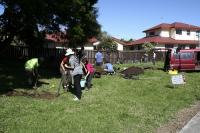 7.9.09
7.9.09
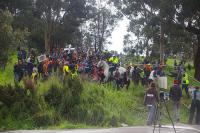 9 September 2009
9 September 2009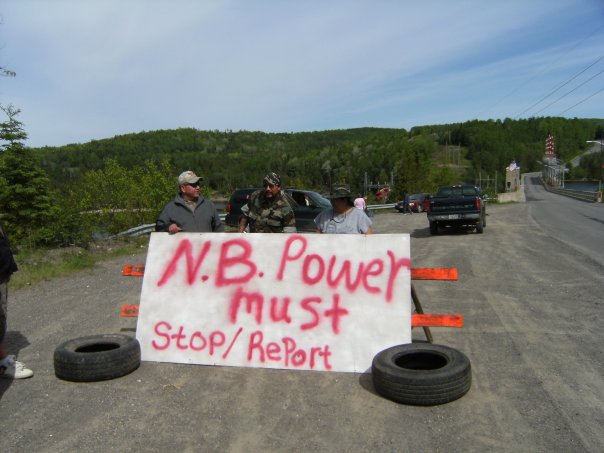 This past June, the Tobique First Nation set up a roadblock on the highway leading to the Mactaquac hydro dam in south central New Brunswick., reviving a struggle for power–hydro power– that goes back to the mid 1800s. The Newly-founded
This past June, the Tobique First Nation set up a roadblock on the highway leading to the Mactaquac hydro dam in south central New Brunswick., reviving a struggle for power–hydro power– that goes back to the mid 1800s. The Newly-founded 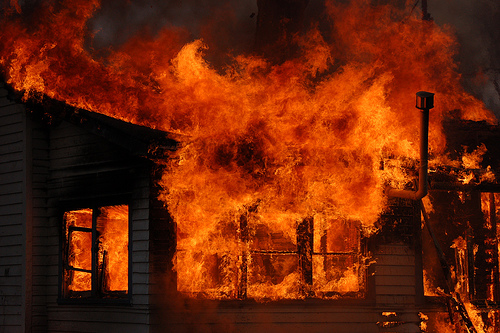 There is somewhat of a mystery surrounding “the ashes of Vedic village”—what remains of the upscale five star tourist resort near Kolkata, West Bengal, after it was set ablaze on August 23.
There is somewhat of a mystery surrounding “the ashes of Vedic village”—what remains of the upscale five star tourist resort near Kolkata, West Bengal, after it was set ablaze on August 23. Despite the European Food Safety Authority and of course Monsanto declaring MON 810 maize to be safe, Germany and France in Spring of this year banned the cultivation of this genetically modified crop. It was the only GM crop permitted in Germany. There are very active opposition movements in both countries – ripping up GM crops both at night and by day, occupying fields were it was due to be planted and other wide-scale protests.
Despite the European Food Safety Authority and of course Monsanto declaring MON 810 maize to be safe, Germany and France in Spring of this year banned the cultivation of this genetically modified crop. It was the only GM crop permitted in Germany. There are very active opposition movements in both countries – ripping up GM crops both at night and by day, occupying fields were it was due to be planted and other wide-scale protests.
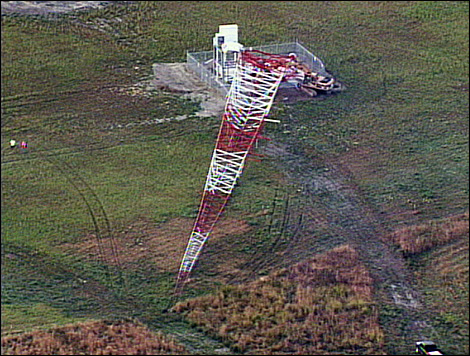 Everett, WA: Two radio station towers were torn down early Friday by the Earth Liberation Front (ELF) in the Lord’s Hills valley in Snohomish County, WA. The towers, owned by station KRKO, have been a source of controversy for years. A sign left at the scene claimedresponsibility by the ELF.
Everett, WA: Two radio station towers were torn down early Friday by the Earth Liberation Front (ELF) in the Lord’s Hills valley in Snohomish County, WA. The towers, owned by station KRKO, have been a source of controversy for years. A sign left at the scene claimedresponsibility by the ELF.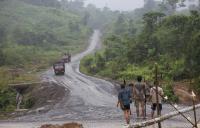 24 August 2009
24 August 2009